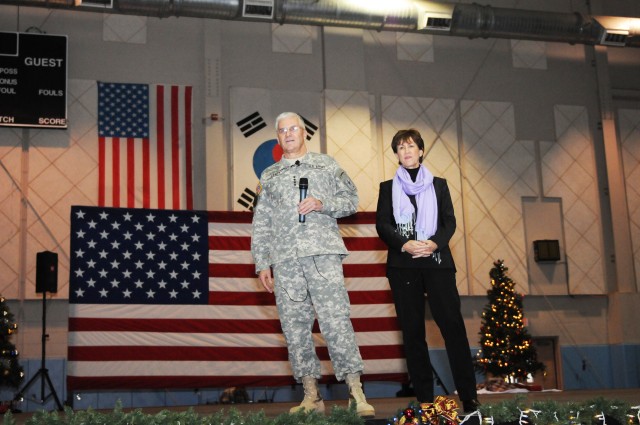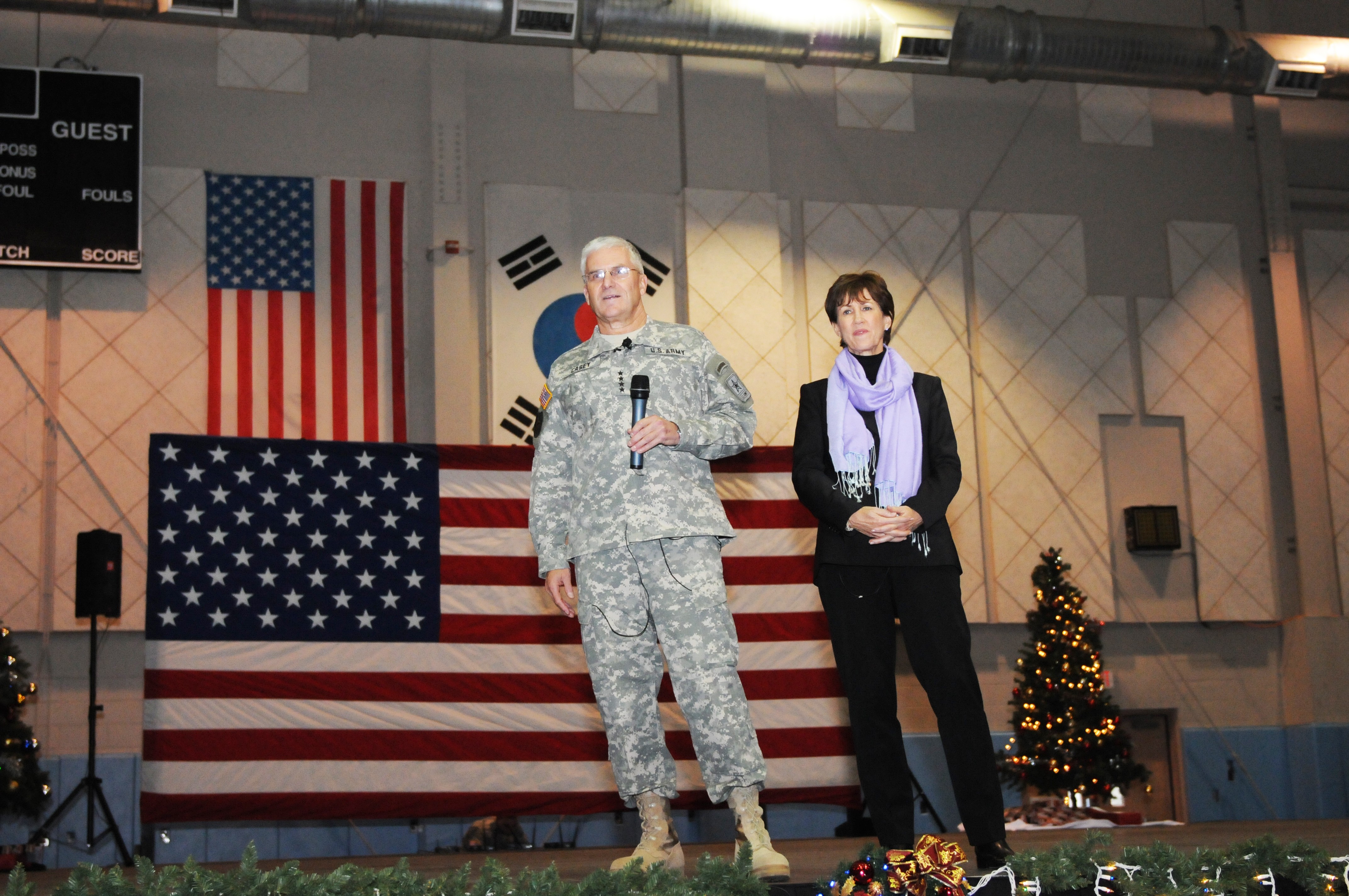CAMP CASEY, South Korea - Army Chief of Staff Gen. George W. Casey, Jr., made an early Christmas visit to Soldiers and families packed into the Carey Physical Fitness Center on Camp Casey, Dec. 22.
The visit to the 2nd Infantry Division was part of a trip that took the 36th CSA to bases in Alaska, Japan and South Korea. Casey's last visit to the installation was one year ago.
"I've been in and out of Camp Casey quite a bit during the course of my career, but it's really great to see this many family members ... and I think it's wonderful," he said.
Casey began the town hall by reenlisting five 2nd ID Soldiers and presenting coins for excellence to 16 2ID Soldiers and two civilian employees from the U.S. Army Garrison Red Cloud Directorate of Plans, Training, Mobility and Security.
During the 31-minute town hall, Casey talked about the current state of the Army and the direction of the force in the next three to five years.
"I couldn't be prouder of what we've accomplished as an Army for our country in the last decade, and particularly in the last year or so," he said in his opening.
Casey said the Army had 150,000 troops deployed to Iraq at its peak and while the force has drawn down, all will be out of the country by this time next year.
He said 100,000 troops have been added since 2007 as part of the Army's transformation from a Cold War force and that the growth will increase the amount of time Soldiers spend at home station between deployments.
He said Soldiers deployed for 15 months and then had 12 or 13 months at home in 2007, but that next year active-duty troops can expect to have two years at home between deployments and four years for the Guard and Army Reserve Soldiers. Casey also said the Army is studying the possibility of one year deployments with three years at home, but the number of deployed Soldiers would need to decrease for it to be feasible.
Casey said that within a year the Army will have converted all of its brigades to the new modular design. As part of the conversion, Soldiers are being moved from Cold War force skills to those that are more relevant for today's Army, he said.
For example, he said 200 tank companies and artillery and air defense batteries were stood down and replaced by a similar number of Special Forces, civil affairs and psychological operations.
"That's the largest organization change in the Army since World War II," he said. "No organization could have done what we've done."
He said that transformation has occurred while the Army was also executing the Base Realignment and Closure Act of 2005 that shuttered some installations and realigned others. Casey said $65 million was pumped into enduring bases and "the quality of facilities on Army installations has increased exponentially in the states."
Looking into the next two to five years, Casey said the Army faces three challenges: maintaining its combat edge, reconstituting an Army that has been at war for a decade and building resilience.
"We must maintain our combat edge, but we must do it intelligently so we don't wear down the force," he said.
Casey said the Army can handle competing interests and that the Comprehensive Soldier Fitness Program was created to give troops the skills they need to handle adversity.
The general ended his remarks with stories about two Medal of Honor recipients - Staff Sgt. Robert Miller, a Special Forces Soldier who gave his life in Afghanistan to save 22 American and Afghan Soldiers and Staff Sgt. Salvatore Guinta, the first living recipient since the Vietnam War.
"What you see in both of those stories are the trust that you see across the Army," Casey said. "It's that bond and trust that has held this great Army together during the last decade of war and what makes us what we are today - the best Army in the world."
The general also took comments and fielded questions from the audience about the U.S. Forces Korea Command Sponsorship Program, preschools in Korea, Army Correspondence Courses and contract employees filling non-combat positions.
The most urgent questions came from a young family member who was concerned that Santa wouldn't find him in South Korea.
"I can guarantee you that Santa will come to Camp Casey," the general quipped to thunderous applause. "Don't let me down, dad!"
Teresa Tucker, wife of Maj. Gen. Michael S. Tucker, commanding general of the 2nd ID, thanked Casey and his wife Sheila who accompanied him, for founding the Army Family Covenant.
"I've been a member of an Army family for 62 years and I get it," the general said. "We would travel around the country in five days in a Country Squire station wagon driving from one post to the other and my mom's motto was 'Make the best of it.' That's no kidding. What I found as an Army guy is that we are asking too much of our Soldiers and families to just ask them to 'Make the best of it.'"
The visit to Camp Casey also included stops at Casey Elementary School, the American Forces Network Korea to tape a holiday message to the troops, the Pear Blossom Family Outreach Center and concluded with lunch with 302nd Brigade Support Battalion Soldiers.


Social Sharing